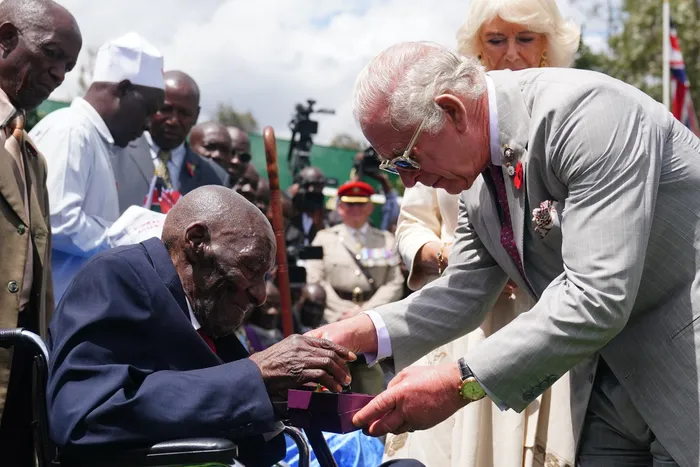Refusal to apologise suggests colonialism was justified

Britain's King Charles III (R) meets war veteran Samwel Nthigai Mburia (L) during a visit to a Commonwealth War Graves Kariokor Cemetery in Nairobi on November 1. Picture: Victoria Jones /AFP
Dr Sizo Nkala
European royalty has been finding its way to Africa in recent weeks. This follows the state visits of the Dutch King Willem-Alexander and Queen Maxima of the Netherlands to South Africa and King Charles III and Queen Camilla of Britain to Kenya.
The visits of the two monarchs to their countries’ former colonies have evoked painful memories of a history of brutality, cruelty, oppression and dispossession against African natives.
The Dutch established the Dutch Cape Colony in 1652 and went on to control it for more than a century and a half under the custody of the Dutch East India Company.
The reign of the Dutch in the south-western part of South Africa was marked by the enslavement, oppression and dispossession of the indigenous people, mostly the Khoisan ethnic group which claims that its forebears were the first inhabitants of present-day South Africa.
The Dutch king and queen witnessed the anger of the indigenous people first-hand over the Dutch’s complicated history in South Africa when they were greeted by protests as they emerged from the Slave Lodge in Cape Town which houses memorabilia of the Dutch’s history in that part of South Africa.
The calls for reparations and historical redress of the injustices perpetrated by the Dutch colonisers have fallen on deaf ears. King Willem-Alexander’s trip focused on improving the bilateral relationship between the Netherlands and South Africa while ignoring the issue of compensation to the indigenous people for their suffering in the hands of the Dutch colonisers.
King Charles III, who succeeded his mother Queen Elizabeth II in September last year, also had to confront the ghosts of his country’s historically controversial relationship with Kenya. For almost 70 years, Kenya and its people suffered under British colonialism between 1895 and 1963.
The colonial era saw the British government set up a white settler minority state which saw a population of 56,000 Europeans lording over more than eight million native Kenyans. The white population monopolised political and economic power while excluding the indigenous people from the mainstream political and economic system.
Millions of Kenyans were dispossessed of their ancestral lands, making space for the vast British-owned tea plantations which thrived through the exploitation of the cheap labour of black people who were denied basic rights. Extra-judicial killings, torture and detention without trial were the colonial government’s toolkit of dealing with native political activists.
These were intensified during the 1952 to 1960 period following the outbreak of the Mau Mau rebellion which was an armed struggle for the independence of Kenya. The rebellion was met with gross violence and human rights abuses including more than 11 000 deaths (more than 1 000 of them by hanging), mass rape and torture. Kenya’s first post-independence president, Jomo Kenyatta, was one of the people who were jailed and tortured as the colonial government tried to suppress the uprising. One of the most prominent leaders of the armed uprising, Dedan Kimathi, was hanged and his body taken away. The British government have kept mum on the whereabouts of his remains. This has been one of the sore points of the post-colonial Kenya-Britain relations.
Many people in Kenya and across the former British colonies across the world have long demanded an apology and some reparations for colonial injustices. As the monarchy was the figurehead of the British empire, it was widely expected that King Charles would do what his mother could not do during her lone tenure as the monarch – acknowledge and apologise for the atrocities and war crimes inflicted on the Kenyan people by the British soldiers.
However, much to the disappointment of scores of people, the monarch only expressed “greatest sorrow and deepest regret” over the colonial injustices perpetrated by the British forces, stopping short of an apology. In his speech at the state banquet he hosted for King Charles, Kenyan President William Ruto praised the king for being courageous and exemplary but insisted that “much remains to be done in order to achieve full reparations”. Although King Charles held a private meeting with the families of some of the anti-colonial struggle leaders, reportedly to better understand what the Kenyan people went through, it is not enough.
Besides, millions of Kenyans were victims of colonial rule, not just individual leaders. In 2013, the British government paid $24 million to more than 5,000 people who had been victims of the violent machinery of the colonial government during the Mau Mau rebellion.
However, apart from the fact that the amount was woefully inadequate, the government did not issue a formal apology. Moreover, although Britain and Kenya have enjoyed a cordial, albeit a typically neo-colonial relationship, the British government’s failure to acknowledge and apologise for the pain its forces inflicted on Kenyan people will always affect the two countries’ relationship.
Implicit in the former colonial powers’ refusal to apologise for the injustices they visited on their colonial subjects is a belief that colonialism was justified. The reluctance to heal the psychological and emotional scars of the colonial era will always be a dent on Africa-Europe relations.
*Dr Nkala is A Research Fellow at the University of Johannesburg’s Centre for Africa-China Studies
**The views expressed do not necessarily reflect the views of Independent Media or IOL